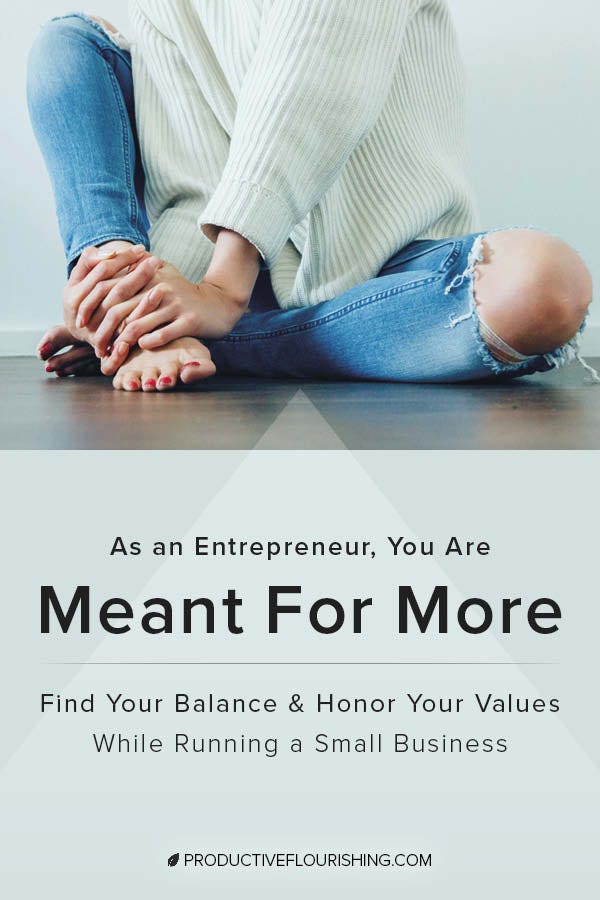We're Meant For More Than Selling and Making Money

A recent email conversation with an old comrade has me a bit unsettled.
He and I shared our journey as entrepreneurs for a good bit but we ultimately took different routes. My passions and gifts laid with operations and strategy, and his were with marketing.
In this conversation, he mentioned how he's glad to be over the existential crises that so many entrepreneurs find themselves in - he helps people sell stuff, he's good at it, and that's enough. He truly is one of the best at what he does.
In some respects, I admire the simplicity and clarity of his stance. To be honest, there are times when I can be envious of the amount of financial success he's had, for we all know that marketing is a great passion to have if you're good at it. (If only I could pick...)
At the same time, I can't follow him there. Perhaps I'm too tied up in my past, but...
I’ve Seen What Happens When We Stop Asking Questions.
I've seen the 19-year olds who are wracked with guilt over killing noncombatants. I've seen the sergeants who instructed their soldiers to run over the small children that were barricading our convoys. I myself have shot at people and don't know whether they stopped firing because they took cover or because I actually hit them.
History is replete with the suffering caused by people simply doing their jobs well without asking questions. (Click to tweet.) How else can you walk a human being into a gas chamber or hack/bludgeon them to death with a cheap Chinese machete? We can do some shock'n awful things if we're not asking the right questions.
But I Just Sell Stuff!
Okay, so those are grim examples, and I don't mean to invoke them just to show the extreme cases. Selling stuff isn't killing people.
I'm sure the marketers and lawyers at Monsanto don't think what they do is harmful, even though they routinely put the hurt on small-time American farmers and prevent starving people from getting access to their seed.
I'm sure that the marketing and acquisition departments at Wal-Mart believe that they're not causing suffering, even though their policies and acquisitions change the economic landscape of nations - rarely for the better in the long-term.
And I'm sure that the internet marketer who's selling their 2k info product doesn't think they're harming people, even though they've consciously created a pool of desperate buyers who've been systematically made more irrational than normal. Nevermind that the 2k was put on credit and is two-month's mortgage.
As entrepreneurs, we have the opportunity to change the way we run our ventures. We can treat people with respect. We can foster good will and keep the focus on helping people. We can define many of the rules of the game we're playing.
And we should.
PRODUCTIVE FLOURISHING
We Can't Know Everything, But We Can Do Our Best
We can't know all the outcomes of our actions and we can't keep people from doing things that are against their better interests. I'm not at all recommending paralysis by analysis or that you shouldn't do anything that might have a negative effect - I fundamentally believe that we often stand to lose more by inaction than principled action.
I also learned long ago not to expect people to have my perspective when it comes to this stuff. Conversions on ethics and reflection thereof just don't suit some people well, and I've taken a queue from Chris Guillebeau and don't intend to convert the uninterested.
All I can say is that I can't go back to just doing my job without asking questions about the impact of what I'm doing. I believe that routinely checking our businesses and entrepreneurial practices against our ethical values – and vice versa – is a valid, worthwhile, and necessary pursuit.
If you don't think you can be a good person while running a thriving business, much of what I say will just infuriate you. Please save us both the time and consider me another sold-out thinker and return to not-doing whatever you're criticizing because you're talking too much about how to do it.
If you think there's no point in incorporating your values into your ventures, you'll find the reflections cumbersome and in the way of your ability to do business. There are plenty of people out there who don't share my approach and they'll be happy to take your attention and money.
A good friend of mine continually reminds me that I'm a bridge-builder. I don't just poke at the chasm and criticize – rather, I do the best I can to start building a bridge from where we are to the other side. In this context, it means I do think being a excellent (virtuous) person and being an excellent (successful) entrepreneur is compatible, and, furthermore, is a life worth living.
Let me be very clear here: I don't know everything and I don't have all the answers. I have made many business mistakes and will continue to do so. At the same time, I have done my best to not make any character mistakes. My experience as a leader has shown me that you can make a lot of mistakes of judgment, but very, very few mistakes of character. Consciously choosing to be less virtuous than I could be is not something I'm wired or inclined to do, even if that puts holds on what I can do in my ventures.
You Might Not Read This Because...
This piece may not be read as much as you'd think. Many of the influential business thought leaders in social media have too many stakes in the game and will either think this is counter to their business platform and brand or will only read me as a worry wort or someone with a scarcity mindset. If they read it, they won't understand it, and if they understand it, they won't share it.
That's okay.
I'll likely lose a few more comrades who find it harder to interact with me and/or support me than to distance themselves from me even more. So be it.
Productive Flourishing has always been about becoming the fullest version of ourselves, and I believe we're meant for more than just selling and making money. In my mind, those are secondary and instrumental goals, with the primary goals being having impact, doing great work, and adding value to the world. Entrepreneurship and business are just two ways to accomplish those primary goals, so the same principles that guide the rest of what I do apply to entrepreneurship and business just the same.
I am a philosopher, after all. Like being a leader, it's not something I can turn off, and it takes way too much effort to mute for long.



